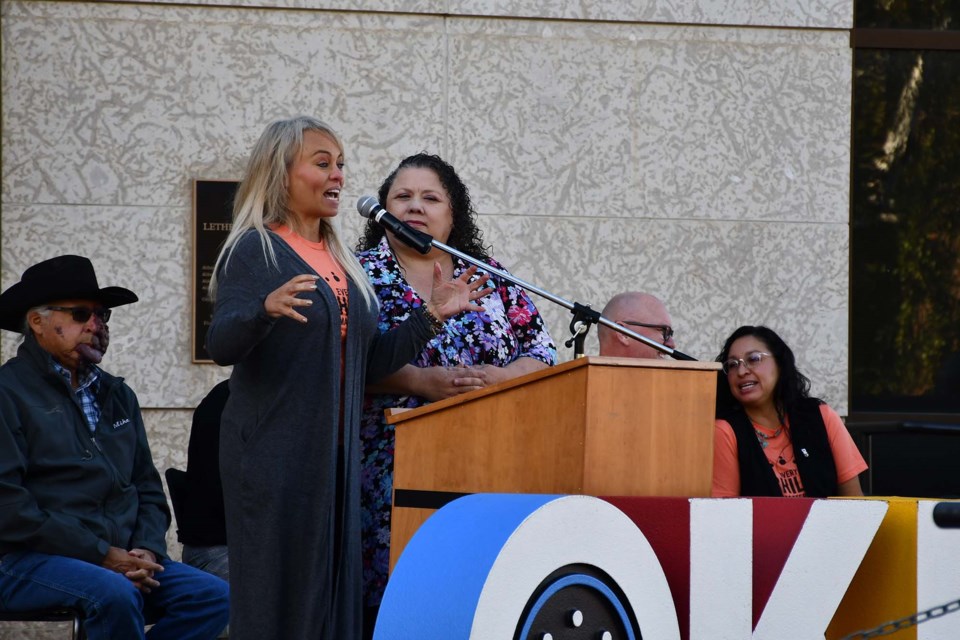As St. Albert city council works on fleshing out a bylaw for a proposed Indigenous advisory committee, other municipalities are already seeing out some of the results of establishing their own reconciliation-centred committees.
The city completed a regional scan of municipal Indigenous committees which highlights seven local communities. Among them is Lethbridge, which established a reconciliation advisory committee in 2018.
Since its inception, the committee has overseen various reconciliation initiatives, from developing educational materials, helping envision a future cultural centre for Indigenous peoples, to aiding with planning for National Indigenous Peoples Week.
Treena Tallow, the committee’s co-chair alongside Cyndi Bester, said the committee is an advisory committee to council, but also goes “a little bit beyond that.”
“We bring the work into our community, and light the fires of reconciliation at every opportunity we can,” Tallow said.
She highlighted a recent pop-up clinic the committee organized in partnership with Alberta Health Services (AHS), which took place on Sept. 23.
The clinic included a powwow to encourage members of the Indigenous community to come out and receive medical care, Tallow said, and offered everything from cancer screenings to vaccine referrals.
“The pandemic has really affected individuals' personal health,” Tallow said. “Our hope is that … other communities see us providing medical care in a different way.”
Despite actioning innovations that could inspire others in the region, Tallow and Bester said the committee has met some challenges to moving forward on initiatives, specifically because of staff changeover at the City of Lethbridge, and a newly elected council.
“That's one thing that we're working on right now is just ensuring that that formula is successful no matter who is at that table delivering the needed end result,” Bester said.
Another issue is following the voting structure in the committee. The structure mirrors other council committees in requiring majority votes, instead of being structured around building consensus, as can be preferable in Indigenous communities, Tallow said.
Notably, St. Albert’s current draft bylaw as last presented to a council committee on June 13 outlines that decisions will be made based on consensus.
Regardless of setbacks, both Bester and Tallow said they have seen a positive shift in the way the City of Lethbridge operates as a result of their committee’s presence.
“Reconciliation is about building trust, building connections, and doing meaningful work,” Tallow said. “In the process, a lot of Indigenous people have come to the table, and they’ve actually become employed by the city.”
At the core of the committee’s work are questions of coming together, Tallow said.
“How do we address some of these systematic challenges that we have collectively?” Tallow asked. “How do we bring an Indigenous voice? … That’s been very enlightening.”
Lewis Cardinal has been involved extensively with reconciliation initiatives in Edmonton for years, for example as chair of the Edmonton Aboriginal Urban Affairs Committee, which last met in 2011.
The committee worked to engage urban Indigenous community leaders in Edmonton on how to better serve the community, and in 2006 released the Edmonton Urban Aboriginal Accord Declaration which aimed to strengthen relationships between the City of Edmonton and urban Indigenous people.
“I always felt it was a great way to pull the community into the process — meeting with them and seeing what they would like to see,” Cardinal said.
In continuing the process of consultation, the committee later created the “Your city, your voice” report on the Edmonton Urban Aboriginal Dialogue, which outlined 22 areas of concern and issues the community felt the city needed to address.
Tangible outcomes from this work include the development of an Indigenous procurement strategy for the City of Edmonton, which opened the doors for the Indigenous contractors and employees to bid on city contracts, Cardinal said.
There is also the kihci askiy project — what Cardinal described as the first Indigenous ceremonial grounds in Canada — which, according to Edmonton's website, is set to begin construction in late 2022. Cardinal is the project manager.
The project will address the need for a ceremony space for Indigenous people within Edmonton.
“Right now, we’re the only people who have to leave the city to go to our ceremonies,” Cardinal said. “We don’t have a temple, a mosque, or a cathedral.”
A third outcome Cardinal highlighted is the Indigenous Peoples Experience at Fort Edmonton Park, to flesh out what Cardinal described as the “other half of the story” of Edmonton, which was formerly lacking.
Cardinal said Edmonton “holds the high watermark” of urban-Indigenous relations in Canada.
“You need a partnership relationship built into that process,” Cardinal said, referring to the process of moving forward on reconciliation.
He said a subcommittee working in the city needs the ability to report directly to council to be effective, as St. Albert’s committee will have — according to the draft bylaw presented June 13.
Ultimately, Cardinal said the steps he has been a part of in the ongoing process of reconciliation in Edmonton have shown grassroots consultation can set the way for levels of government when it comes to reconciliation.
“This whole process was the first time where the Indigenous community in Edmonton all sat together and looked in the same direction, and created for themselves … the initiatives, projects, and ideas that we need to see happen in our city,” Cardinal said.
“When the people lead, the leaders follow, and that’s what we proved.”




